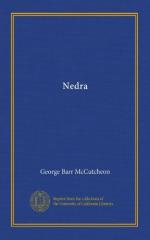CHAPTER X
A SHARP ENCOUNTER
The Tempest Queen carried a merry cargo. The young officers, the Americans and rich pleasure seekers from other lands—young and old—made up a happy company. Of all on board, but one was despised and loathed by his fellow-travellers—Lord Huntingford. Not so much for his manner toward them as for his harsh, bitter attitude toward his young wife.
He reprimanded and criticised her openly, very much as he would have spoken to a child, and always undeservedly. She endured patiently, to all appearances, and her cloud of humiliation was swept away by the knowledge that her new friends saw the injustice of his attacks. She did not pose before them as a martyr; but they could see the subdued and angry pride and the checked rebellion, for the mask of submission was thin, even though it was dutiful.
The two young women, unlike as two women could be, became fast friends. The Englishwoman was refinement, sweetness, even royalty itself; the American, proud, equally refined, aggressive and possessed of a wit, shrewdness and spontaneity of humor that often amazed the less subtle of the two. Tinges of jealousy sometimes shot into Grace’s heart when she saw Hugh talking to the new friend, but they disappeared with the recollection of her Ladyship’s pure, gentle nobility of character. It is seen rarely by one woman in another.
And Veath? The stalwart, fresh-hearted, lean-faced Indianian was happier than he had dreamed he could be when he drearily went aboard a ship at New York with the shadow of exile upon him. He had won the friendship of all. The brain of the Westerner was as big as his heart, and it had been filled with the things which make men valuable to the world. Men called him the “real American,” and women conveyed a world of meaning in the simple, earnest expression—“I like Mr. Veath.”
Veath was now unmistakably in love with Grace Vernon. The fact was borne in upon him more and more positively as the sunny days and beautiful nights drew them nearer to the journey’s end. Occasionally he lapsed into strange fits of dejection. These came when he stopped to ponder over certain prospects, hopes and the stores of life. At times he cursed the fate which had cast him into the world, big and strong, yet apparently helpless. It had not been his ambition to begin life in the capacity which now presented itself. His hopes had been limitless. Poverty had made his mind a treasure; but poverty had also kept it buried. He saw before him the long fight for opportunity, position, honor; but he was not the sort to quail. The victory would be glorious when he thought what it might bring to him from Grace Ridge—she who was going to be a missionary. A long, hard fight, indeed, from revenue officer to minister plenipotentiary, but it was ambition’s war.
And Hugh? As the days went by, his jealousy of Veath became almost intolerable. He dared not speak to Grace about it, for something told him she was not to be censured. Even in his blind rage he remembered that she was good and true, and was daring all for his sake. In calmer moments he could not blame Veath, who believed the young lady to be sister, and not sweetheart.




